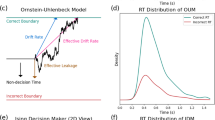Abstract
By introducing a response-time measure in the field of comparative optimism, this study was designed to explore how people estimate risk to self and others depending on the evaluation order (self/other or other/self). Our results show the interdependency between self and other answers. Indeed, while response time for risk assessment for the self does not vary depending on the evaluation order, assessment for an average other takes longer in the other/self than in the self/other order. Thus, prior self-estimate appears to facilitate the construction of subsequent risk estimates for others. Our data indicate that the two evaluation orders do not correspond to strictly equivalent procedures; the other/self order requires extra cognitive effort and leads to greater comparative optimism levels. These findings should alert researchers that the measurement procedures, classically considered as interchangeable in the area of comparative optimism, actually generate different ways to construct the answers. Our results are discussed in terms of anchoring and asymmetry effects.
Similar content being viewed by others
References
AUCOTE, H. M., & GOLD, R. S. (2005). Non-equivalence of direct and indirect measures of unrealistic optimism. Psychology, Health & Medicine, 10(4), 376–383. doi:10.1080/1354850042000326601
BATES, T. C., & STOUGH, C. (1998). Improved reaction time method, information processing speed, and intelligence. Intelligence, 26(1), 53–62. doi:10.1016/S0160-2896(99)80052-X
CAMPBELL, J., GREENAUER, N., MACALUSO, K., & END, C. (2007). Unrealistic optimism in Internet events. Computers in Human Behavior, 23(3), 1273–1284. doi:10.1016/j.chb.2004.12.005
CHAMBERS, J. R., WINDSCHITL, P. D., & SULS, J. (2003). Egocentrism, event frequency, and comparative optimism: When what happens frequently is “more likely to happen to me.” Personality and Social Psychology Bulletin, 29, 1343–1356. doi:10.1177/0146167203256870
CLEMENT, R. W., & KRUEGER, J. (2000). The primacy of self-referent information in social consensus. British Journal of Social Psychology, 39, 279–299. doi:10.1348/014466600164471
DUNNING, D. (2002). The relation of self to social perception. In M. Leary and J. Tangney (Eds.), Handbook of self and identity (pp. 421–441). New York: Guilford Press.
DUNNING, D., & HAYES, A. F. (1996). Evidence for egocentric comparison in social judgment. Journal of Personality and Social Psychology, 71(2), 213–229. doi:10.1037/0022-3514.71.2.213
EISER, J. R., PAHL, S., & PRINS, Y. R. A. (2001). Optimism, pessimism, and the direction of self-other comparisons. Journal of Experimental Social Psychology, 37, 77–84. doi:10.1006/jesp.2000.1438
GILOVICH, T., & GRIFFIN, D. W. (2010). Judgment and decision making. In D. T. Gilbert and S. T. Fiske (Eds.), The handbook of social psychology (5th ed., Pp. 542–588). New York: McGraw-Hill.
GOLD, R. S. (2008). Unrealistic optimism and event threat. Psychology, Health & Medicine, 13, 193–201. doi:10.1080/13548500701426745
HARRIS, P., & MIDDLETON, W. (1994). The illusion of control and optimism about health: On being less at risk but no more in control than others. British Journal of Social Psychology, 33, 369–386. doi:10.1039/FD9949900369
HIGGINS, E. T., & BARGH, J. A. (1987). Social cognition and social perception. Annual Review of Psychology, 38, 369–425. doi:10.1146/annurev.ps.38.020187.002101
HOORENS, V. (1995). Self-favoring biases, self-presentation and the self-other asymmetry in social comparison. Journal of Personality, 63, 793–817. doi:10.1111/j.1467-6494.1995.tb00317.x
HOORENS, V., & BUUNK, B. P. (1993). Social comparison of health risks: Locus of control, the person-positivity bias and unrealistic optimism. Journal of Applied Social Psychology, 23, 291–302. doi:10.1111/j.1559-1816.1993.tb01088.x
INGLEDEW, D. K., & BRUNNING, S. (1999). Personality, preventive health behaviour and comparative optimism about health problems. Journal of Health Psychology, 4, 193–208. doi:10.1177/135910539900400213
KARYLOWSKI, J. J. (1990). Social reference points and the accessibility of trait related information in self-other similarity judgments. Journal of Personality and Social Psychology, 58, 975–983. doi:10.1037/0022-3514.58.6.975
KLAR, Y., & GILADI, E. E. (1999). Are most people happier than their peers, or are they just happy? Personality and Social Psychology Bulletin, 25(5), 585–594. doi:10.1177/0146167299025005004
KOSINSKI, R. J. (2008). A literature review on reaction time. Clemson University, Department of Biological Sciences. Retrieved January 15, 2009, from http://biology.clemson.edu/bpc/bp/Lab/110/reaction.htm
KRUGER, J., WINDSCHITL, P. D., BURRUS, J., FESSEL F., & CHAMBERS, J. R. (2008). The rational side of egocentrism in social comparisons. Journal of Experimental Social Psychology, 44, 220–232. doi:10.1016/j.jesp.2007.04.001
LE BARBENCHON, E., MILHABET, I., STEINER, D. D., & PRIOLO, D. (2008). Social acceptance of exhibiting optimism. Current Research in Social Psychology, 14(4), 52–63.
OTTEN, W., & VAN DER PLIGT, J. (1996). Context effects in the measurement of comparative optimism in probability judgments. Journal of Social and Clinical Psychology, 15, 80–101. doi:10.1521/jscp.1996.15.1.80
PERLOFF, L., & FETZER, B. (1986). Self-other judgments and perceived vulnerability to victimisation. Journal of Personality and Social Psychology, 50(3), 502–510. doi:10.1037/0022-3514.50.3.502
PRICE, P. C., PENTESCOT, H. C., & VOTH, R. D. (2002). Perceived event frequency and the optimistic bias: Evidence for a two-process model of personal risk judgments. Journal of Experimental Social Psychology, 38, 242–252. doi:10.1006/jesp.2001.1509
ROSE, J. P., ENDO, Y., WINDSCHITL, P. D., & SULS, J. (2008). Cultural differences in unrealistic optimism and pessimism: The role of egocentrism and direct vs. indirect comparison measures. Personality and Social Psychology Bulletin, 34, 1236–1248. doi:10.1177/0146167208319764
SPITZENSTETTER, F. (2003). Biais d’optimisme et biais de mesure: L’évaluation relative ou absolue du risque personnel. Les Cahiers Internationaux de Psychologie Sociale, 58, 19–27. doi:10.1016/j.pto.2006.05.001
WEINSTEIN, N. D. (1980). Unrealistic optimism about future life events. Journal of Personality and Social Psychology, 39, 806–820. doi:10.1037/0022-3514.39.5.806
WELKENHUYSEN, M., EVERS-KIEBOOMS, G., DECRUYENAERE, M., & VAN DEN BERGHE, H. (1996). Unrealistic optimism and genetic risk. Psychology and Health, 11, 479–492. doi:10.1080/08870449608401984
Author information
Authors and Affiliations
Corresponding author
Rights and permissions
About this article
Cite this article
Spitzenstetter, F., Schimchowitsch, S. Interdependency Between Risk Assessments for Self and Other in the Field of Comparative Optimism: The Contribution of Response Times. Psychol Rec 62, 115–124 (2012). https://doi.org/10.1007/BF03395791
Published:
Issue Date:
DOI: https://doi.org/10.1007/BF03395791




